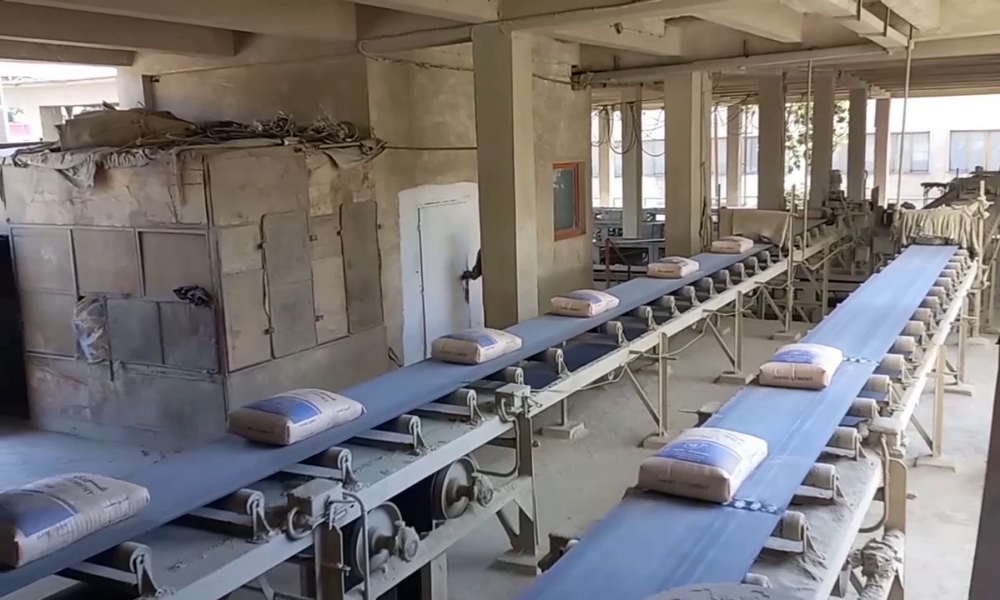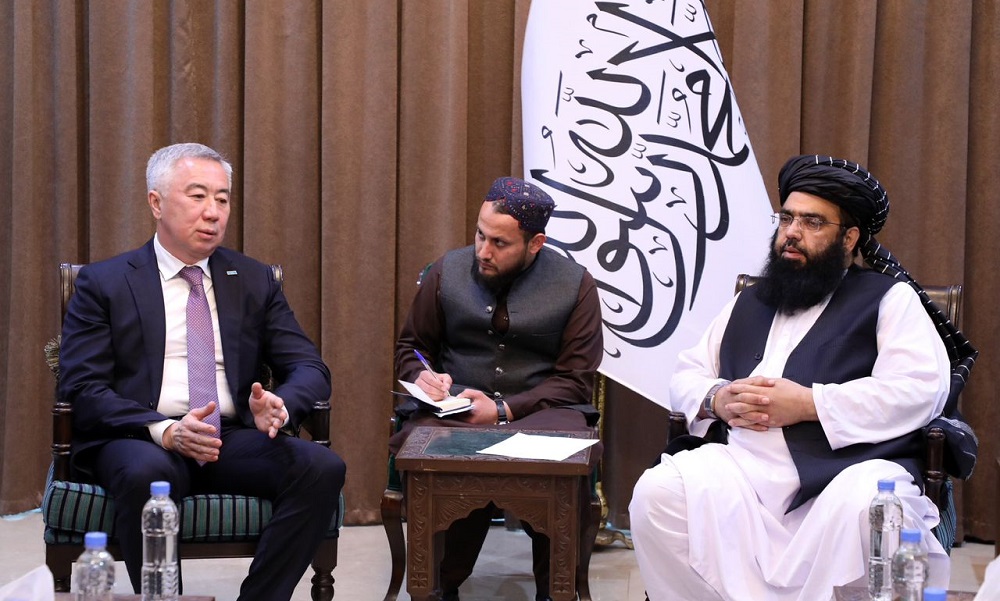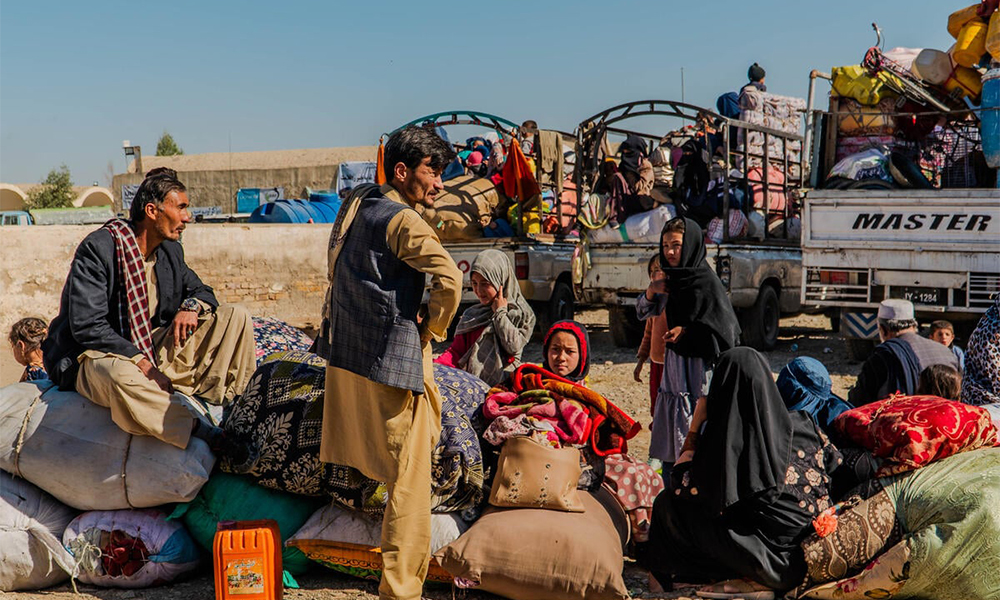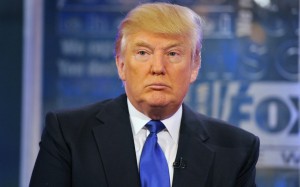Latest News
Trump struggles to explain ‘America first’ foreign policy

AP:_ Donald Trump strained to lay out a clear vision of his “America first” foreign policy on Wednesday, vowing to substitute hard-headed realism for what he called a post-Cold War era replete with U.S. national security failures.
Yet the Republican presidential front-runner outlined no strategy for how he’d make the United States at the same time a “consistent” and “unpredictable” force in the world. And he didn’t appear to allay the concerns of U.S. and international critics — Republicans at home as well as Democrats — who see him as unfit for the responsibilities of commander in chief.
“‘America first’ will be the major and overriding theme of my administration,” Trump declared, echoing motifs from his campaign that is now close to sealing the GOP nomination.
Delivering his lines in a more sober, restrained manner than usual to cast himself as presidential material, the billionaire businessman and reality TV star toned down or omitted several of his most explosive — and oft-repeated — barbs. He made no reference to forcing Mexico to pay for a wall across the nation’s Southern border. He also didn’t revisit the idea of allowing Japan, South Korea, Saudi Arabia or any other country to develop nuclear weapons for self-defense purposes.
Instead, Trump took aim at President Barack Obama’s embrace of an Iran nuclear agreement, Obama’s failure to eliminate the Islamic State group and other examples of what he termed a foreign policy of “randomness” and “chaos.” His criticism extended to Republicans, too, assailing President George W. Bush for the Iraq war and mocking a foreign policy establishment of “old people” who have scoffed at his diplomatic and national security credentials.
“It’s time to shake the rust off America’s foreign policy,” Trump told academics, reporters and a smattering of supporters in a Washington hotel ballroom after being introduced by one such old voice of the foreign policy elite — Zalmay Khalilzad, a Bush-appointed former ambassador to Afghanistan, Iraq and the United Nations.
“My foreign policy will always put the interests of the American people and American security above all else,” he said. “It has to be first. Has to be. That will be the foundation of every single decision that I will make.”
Trump’s “new direction” in American foreign policy was vague even by the standards of presidential campaigns.
The U.S. approach to fighting IS will be “strong” under a Trump administration, he vowed, offering no indication of troop levels he might authorize. He intends to ease tensions with Russia while negotiating “from a position of strength,” but he wouldn’t say what that means for U.S. sanctions punishing Moscow for annexing Ukrainian territory. He said he’d balance America’s massive commercial deficit with China “quickly,” without a word about tariff policy or existing trade agreements.
Trump also contradicted his own broad-brush approach to foreign policy. He said at one point that the best way to achieve his goals was through “disciplined, deliberate and consistent” policy. Later, however, he exhorted the nation to “be more unpredictable” in how it combats enemies.
“We have to be unpredictable starting now,” Trump declared in the 38-minute speech hosted by the Center for the National Interest, an organization founded by President Richard Nixon.
Democratic and Republican opponents immediately pounced on the speech’s substance, or lack thereof.
“No one wants an unpredictable ally,” said James Stavridis, the retired Navy admiral who served as NATO’s top commander in Europe from 2009 to 2013. “It sounds like isolationism.”
The “America First” anthem “is precisely what the world worries about,” said Christopher Hill, a Bush-appointed former ambassador to Iraq.
But Republican former presidential candidate Newt Gingrich voiced support.
“This was a serious foreign policy speech by Trump,” he tweeted. “It is worth reading and thinking about. It will be ridiculed by Washington elites.”
And the chairman of the Senate Foreign Relations Committee, Bob Corker of Tennessee, called it “a very good foreign policy speech,” but said he hoped for a time when “candidates in both parties will begin focusing not only on the problems we face but on solutions.”
Fresh off a sweep of five Northeastern primaries and on a clearer path to nomination, Trump repeated assertions that U.S. allies must contribute more to international security agreements, such as NATO, to reap the benefits of American military protection. Yet he tried to assure allies the U.S. would recommit to them if he’s elected president.
Some of the messaging was no different than Obama’s, Bush’s or any other recent U.S. leader. “We should seek common ground based on mutual interests,” Trump said of Russia and China, two leading geopolitical rivals.
But his criticism of the last 15 years of U.S. policy in the Mideast was particularly pointed. Trump’s likely opponent in the general election, Democrat Hillary Clinton, was Obama’s secretary of state and a key architect of the effort.
“We’ve made the Middle East more unstable and chaotic than ever before,” said Trump, lumping in Obama’s abandonment of U.S. ally Hosni Mubarak in Egypt, a record of recriminations with Israeli Prime Minister Benjamin Netanyahu and a refusal to enforce his own “red line” for military action after Syrian President Bashar Assad unleashed chemical weapons.

Latest News
Ghori State Cement in Baghlan increases production

Officials at Ghori State Cement in Baghlan province say the amount of cement produced at this plant has increased compared to the past.
According to company officials, 150,000 tons of cement was produced in 1402 [solar year] and they are trying to increase the amount to 180,000 tons this year.
“Last year, we successfully produced 150,000 tons of cement and sold it to the market. Fortunately, in 1402, we had more than 200 million afghanis in revenue,” said Abdul Wakil Qayumi, financial and administrative deputy of the company.
The plant officials stated that efforts are underway to increase the production capacity, and with the increase of the production capacity, they will produce 1000 bags of cement per day.
“Currently, our four ovens are active, and we produce approximately 1,000 to 1,200 tons of cement in twenty-four hours,” said Mohammad Tahir, packaging manager for the company.
In this company, jobs are created for 750 individuals, and some workers have asked the traders to invest in the country and provide work for young people.
“Some more factories should be built in our country so that less foreign cement is imported into the country and we use our own products,” said one of the company workers.
Ghori Baghlan Cement Company was established about 40 years ago and is considered one of the largest cement production companies in Afghanistan.
The management of this company is carried out by the National Development Corporation (NDC).
Latest News
Regional countries should jointly expand stability and development: Deputy PM

Mawlawi Abdul Kabir, Political Deputy Prime Minister, has said in a meeting with the Deputy Prime Minister of Kazakhstan in Kabul that regional countries should play their role in the implementation of large regional projects.
Kabir also invited Kazakh businessmen to invest in Afghanistan, his office said in a statement.
He added that the Islamic Emirate fully controls Afghanistan’s borders, has eliminated drugs and corruption, and restored national sovereignty.
According to the statement, Deputy Prime Minister of Kazakhstan Serik Zhumangarin appreciated the progress made by the Islamic Emirate in Afghanistan and said that his country is ready for long-term trade, transit and investment relations with Afghanistan.
Zhumangarin expressed his country’s readiness to grant scholarships to Afghan youth and added that Afghanistan is currently an example of a peaceful country in the region, and due to this, the world wants to establish relations with the Islamic Emirate in various fields.
He also called for the start of direct flights between Kabul and Almaty and said that his country is ready for bilateral cooperation with the Afghan government in the cultural field.
Latest News
Red Cross official seeks ‘staggered’ return of Afghan refugees from Pakistan

A senior Red Cross official has called for the return of Afghan refugees from Pakistan to occur “in a more staggered way” so Afghanistan can better absorb them.
“It will be important to work with the government of Pakistan in 2024 to ask that if there are going to be returnees,” that they arrive “in smaller numbers at a time just so it is more manageable on the Afghan side,” said Alexander Matheou, regional director, Asia Pacific Region for the International Federation of the Red Cross, Voice of America (VOA) reported on Saturday.
Speaking in the Qatari capital, Doha, Matheou told journalists on Friday the challenges facing Afghan returnees from Pakistan was one of several pressing issues he discussed with the officials of the Islamic Emirate in Kabul.
“You will be aware that over half a million have crossed the border over recent months, and it is likely that we will see large numbers of new arrivals in the coming months,” he said.
“I imagine this is probably the largest population flow in a short period of time in Asia since the population movement from Myanmar into Bangladesh in 2017,” he added. “So, it is a significant event.”
Since October, Pakistan has expelled more than 500,000 Afghan refugees who lacked proper documentation.
Matheou noted many of the returnees have lived in Pakistan for decades and are ill-equipped to begin a new life in a country that to them is unknown, without government or international support.
He described the returnees as being in generally poor health, especially the children, who account for nearly half of all returnees.
“The evidence of that was we visited clinics where they reported a real spike in cases of acute malnutrition coming from the arrivals from Pakistan.
“We visited routine immunization programs of the IFRC and the Afghan Red Crescent in the villages, and there it was clear looking at the children that as well as being anemic, you could see wasting and stunting among the children,” he said.
-

 World5 days ago
World5 days agoNorth Korea officials visit Iran in a rare public trip
-

 Sport4 days ago
Sport4 days ago‘Serious talent’ Fraser-McGurk bonds with Warner to light up IPL
-

 Latest News4 days ago
Latest News4 days agoOver 1,000 Afghan refugees forced out of Pakistan in one day
-

 Sport2 days ago
Sport2 days agoAfghanistan beat Iraq 5-3, inch closer to Futsal World Cup berth
-

 Regional2 days ago
Regional2 days agoNew UK sanctions target Iranian drone industry
-

 Regional3 days ago
Regional3 days agoTurkey accuses U.S. of double standards over Gaza in rights report
-

 Latest News2 days ago
Latest News2 days agoEU allocates 17 million euros to support Afghans on the move
-

 Latest News2 days ago
Latest News2 days agoPakistan extends registered Afghan refugees’ stay till June 30
















